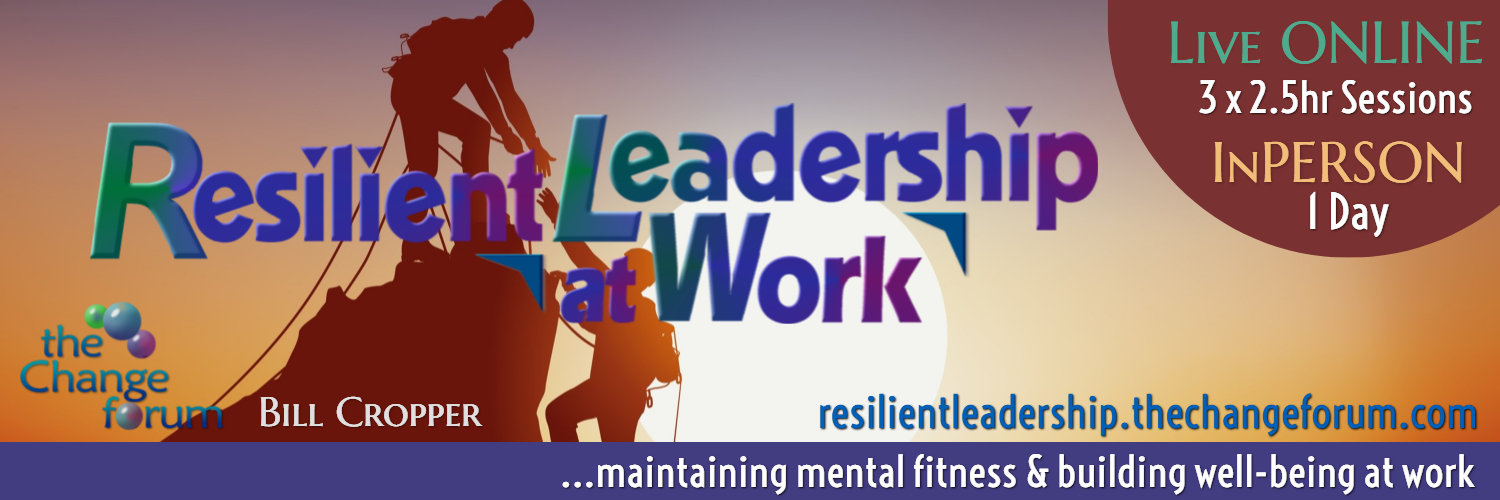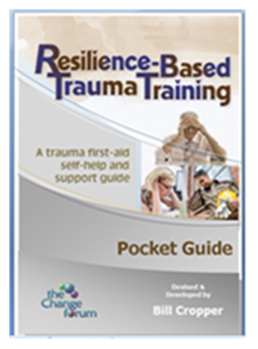Action-based leadership clinic on ways to re-charge yourself and
help boost your team’s reserves of resilience & positivity
...Live in-person and Live-online...
1-day face-to-face small group coaching clinics on-location
or join our 3-Session Live-Online program
designed and presented by Bill Cropper
also delivered In-House for your leadership group
Call or enquire online to arrange a quote
Resilient Leadership at Work
...maintaining mental fitness & building well-being at work...
Whether it's work-overload, endless changes, unbearable bosses or toxic team-mates, corrosive conversations, caustic culture or ridiculous deadlines, some of us seem to stay cool, calm and collected in the face of such work stress and pressure, regardless. We get on with the job and succeed in the face of odds where many would fail.
The secret is resilience: an emotional state that has a lot to do with wellbeing, managing stress, team performance and organisational vitality
What's Resilience?
All teams suffer stress and setbacks. Some blame, hold grudges and wallow in misery. Others bounce-back.
That’s resilience – a personal trait we all have that helps us withstand life’s trials and tribulations, stay buoyant, balanced and able to recover rapidly from adversity, crises and calamities that come our way; to adapt, adjust then carry on. Brain-wise, resilience relates to 'recovery time’. As Richard Davidson says, it’s how fast we can 'shake off a setback', 'regain emotional equilibrium’ and 'return to a steady state' after the air's been knocked out of us.

Resilience is about personal strength, mental toughness and being flexible enough to adapt to what life throws at you. It’s what allows both individuals and whole teams to take knocks, try again, come back strong and take positive action to refunction. It acts as a buffer, helping us withstand stressful events rather than succumb.
Many of us, though, have trouble handling unsettling situations. We feel helpless, hopeless, overwhelmed. This breeds other feelings like cynicism, apathy, anger, resentment. Drained of vitality, we suffer, work suffers and often we seem to make sure others suffer too.
Resilience isn't something you’re born with or not, though some seem to have more of it than others at times. The good news is it’s something we can all learn to strengthen in ourselves.
Building-up our reserves of resilience simply makes sense. It’s a necessity to cope with endless change, ever-busier and more stress-laden work cultures and the COVID-driven disruptions we currently live with.
Ultimately, individuals benefit from fostering a more mentally-fit, trauma-resistant and well workplace. It also makes teams more positive, vital, focused, productive and high-performing. So organisations benefit too.
"Resilience is such an extraordinarily important capability because we live in a world that’s one nonstop crisis—one calamity, one emergency, one unexpected, often difficult surprise—after another, like waves breaking on the shore.”
Professor Nancy Koehn Harvard Business School
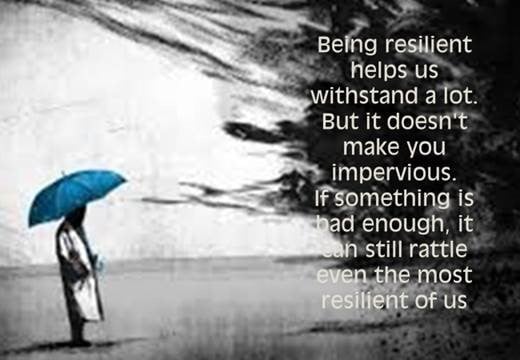
“Definitely worth coming along. A really good, engaging and very relevant workshop that placed a high value on building resilience as a core element to a healthy workplace, positive team culture and balanced healthy life. I appreciated new strategies around building and maintaining resilience for myself and my colleagues. And the pocket guide is a terrific handbook to refer back to."Jess, Centacare Brisbane
What does this Clinic cover?
Resilient Leadership at Work is a 1-day, interactive self-coaching clinic that looks at your role as a resilient leader. It has lots of down-to-earth tools, tips and one of our well-regarded take-away pocket guides to help you and your team build-up your reserves of resilience and buttress workplace well-being. In this jam-packed 1-day clinic we look at...
What resilience is: helping you handle stress, stay afloat and keep functioning
Role resilient leaders play as emotional caretakers in supporting teams
How to remain in your resilience-zone longer and maintain mental fitness
Resilience-drainers and signs your reserves of resilience may be depleted
5 Resilience-Builders for focus, positivity, emotional balance, stress and mindfulness
Resilience-building tools and actions your team can take to maintain well-being
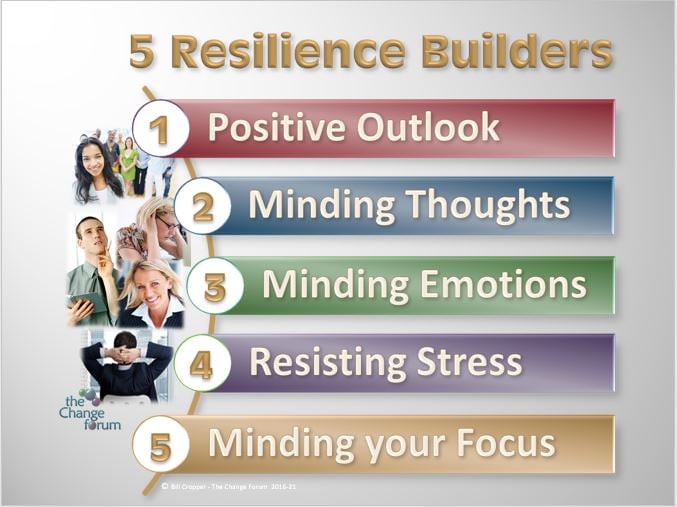
About our 5 Resilience-Builders Model:
If you're resilient, you're most likely emotionally balanced, focused, mindful, connective, possess a positive outlook on life's up-and-downs, and tend to take stress and setbacks in your stride. Which just about sums up the 5 Resilience-Builders this course and its accompanying guide revolves around...
Each is backed up by brain-science, working on close links between thinking, feeling, mind and body, to build and maintain resilience in the face of challenges like work-stress and trauma.
Each has a selection of tools you can use, either personally or with your whole team, to strengthen your resilience practices. You don't need to use all the tools at once. Just take on-board a few and start doing them...
Research shows practising strategies like these helps keep our resilience reservoirs topped-up so we stay more focused, positive and more in control of stress and anxiety-creating feelings or thoughts that affect mind and body.
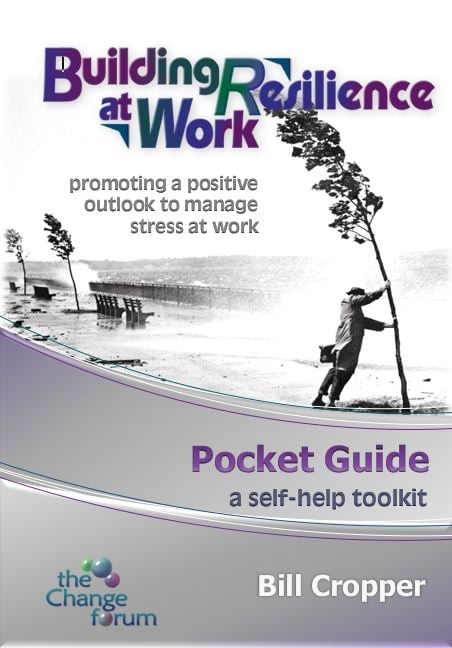
Building Resilience at Work complements our other guidebooks, going into depth on each of 5 Resilience-Builders introduced in our work-based trauma first aid self-help support guide, Resilience-Based Trauma Training. It also relates to our guides to EI at Work and Social Intelligence: EI in Teams where resilience and positivity are 9th of 10 dimensions of Social and Emotional Team Intelligence.
“Great course content with a fantastic facilitator and a handy pocket guide with practical tips and tools. There’s a notable difference between a facilitator who’s paid to run a course, and someone who’s authored the content, constructed the course and is passionate about helping others. I have been to a lot of courses over the years and I’d rate Bill’s as one of the best!"
Jude C, Metro North Hospital & Health Service
Leading Resilience
In today’s turbulent work landscape, leaders face a raft of new challenges. Stressful things happen but 2020-21 certainly presented many leaders and workplaces with exceptionally heightened levels of anxiety and uncertainty. To successfully lead teams through times of uncertainties, disruption and rapidly changing circumstances you need to be adaptive, focused, determined, persistent but perhaps most critically, resilient.
There's a few things that never used to be in your job description as a leader or manager.
Maintaining workplace wellbeing and supporting staff through stress, disruption and trauma, and the troubled behaviour that can come along with it, are some of them.
As a leader, you act as an emotional care-taker for your team’s wellbeing. They look to you to help them stay buoyant, stress-resistant, emotionally steady, and support them through tough times. To support them well, you need to be able to steer others with courage, conviction and purpose, caring and compassion.
Resilient Leadership Rising
Resilience is a critically defining factor for effective leadership. Recent research shows that from an array of different leader traits, those who rate high on resilience are seen overall as more effective leaders by their managers, peers and teams.
Role-modelling resilience may be the most vital trait you can demonstrate as a leader.
You need to nurture it in yourself first to sustain your energy level and focus under pressure, adapt to disruptive change, overcome hurdles and setbacks – and help teams do the same.

- The real test of resilient leaders is not how they perform during good times. It’s how they demonstrate emotional balance, tenacity, perseverance and resolve in trying times.
- Faced with setbacks or adversity, resilient leaders regain composure rapidly, find ways to move past obstacles rather then get bogged down by them, and can actually grow stronger as a result.
- And as leaders become more robust, resilient and emotionally balanced, teams may become more positive, focused, productive and less rattled and stress resistant too.
It’s also looking like resilience may even rank as a factor in organisation success.
This clinic looks at what you need to do as a leader to cultivate resilience in yourself first and then build and maintain it in your team. It explores 6 attributes of resilient leaders which we think are most central. They’re summed up in PREARS (pronounced prayers):
P
Positivity and Purpose: Resilient leaders maintain a positive mindset and a clear focus on a purpose that inspires and motivates. They also need to steer others with purpose, which calls for persistence, courage, conviction and determination
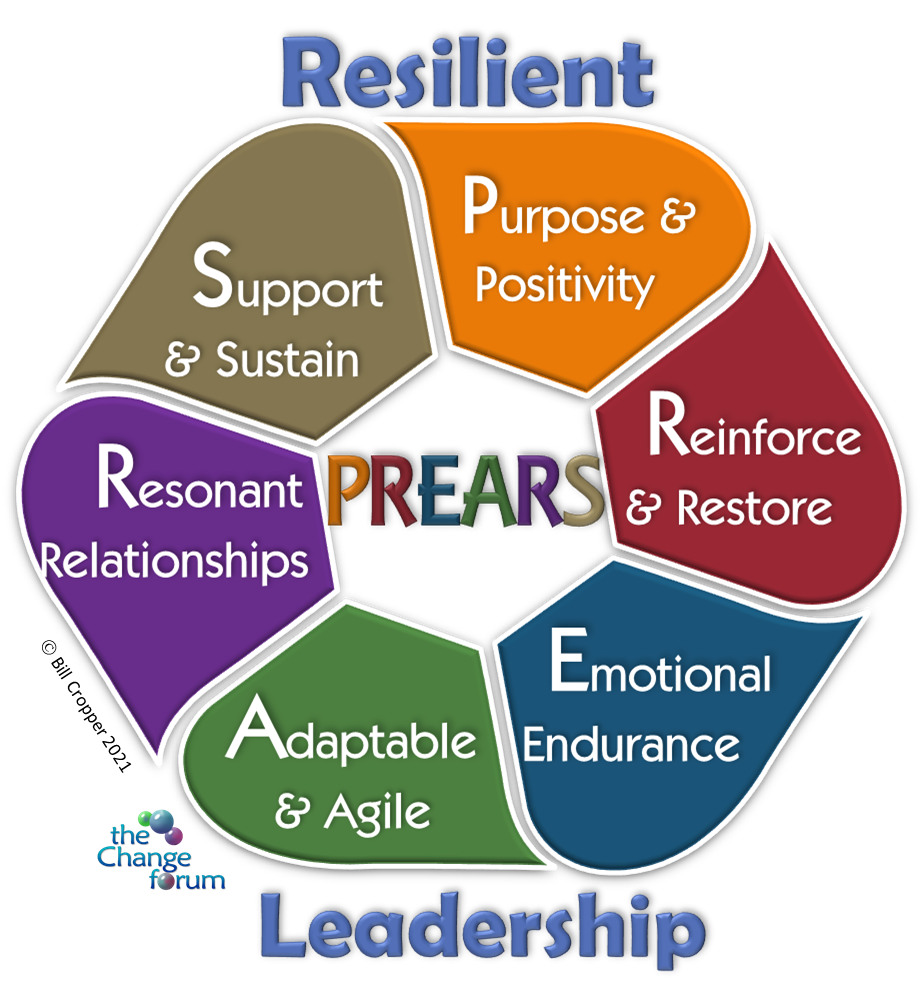
R
Reinforce and Restore: is about resilient leaders keeping an eye on what they can do to strengthen, retain and refresh reserves of resilience in themselves and their teams, and rebuild it if they notice reserves are depleted after an incident or a series of different adverse events
E
Emotional Endurance: Resilient leaders stay emotionally balanced and have the endurance to manage and reduce disruptive emotions in themselves and others. This means they’re emotionally intelligent, self-reliant and self-managing. They have a strong internal locus of control – meaning they believe they determine their own destiny by what they do and how they respond to challenging situations, not the situations themselves. It’s also about how we tend to think about a setback or challenge.
A
Adaptable and Agile: Resilient leaders are adaptable and mentally agile – able to change to cope with reversals and disruptions and to bend rather than break. They don’t focus on rigidity and order – they focus on fluidity and flexibility. Tough, steadfast, fixedly determined are traits we relate to resilience. But a key resilience skill is also allowing yourself sometimes to be moulded and shaped by adverse events, pivot in a new direction and take a new path.
R
Resonant Relationships: Resilient leaders are approachable, caring and connective so teams feel safe, understood, valued and acknowledged. They build strong, positive relationships with people they lead and keep up those connections. This shores up resilience because connections and cohesion are strong medicine for resisting pressure and stress. This also rests on emotional as well as social intelligences
S
Support and Sustain: Forging strong connections which we’ve already mentioned, is so important for support and sustaining individuals and teams. This is enabled by another emotional intelligence faculty, namely empathy. Resilient leaders stay mindful and focused through challenging times. They also keep an eye out for what they can do to stem resilience-drain and sustain their current levels of resilience – to plug holes in any leaky resilience buckets.
Finally, there’s another ubiquitous and much talked-about quality these days, that by extension has an enriching effect on resilience. It’s compassion.
Cultivating compassion for both self and others according to research mentioned by the Greater Good Science Center at UC Berkeley, shows how compassion practices increase positive emotions, create positive work relationships, increase happiness and well-being and decrease stress. If that’s the half-of-it, it can’t be ignored.
“Awesome workshop mate... Informative with real, well-researched facts and information provided to support what was being taught clearly linked to our jobs and personal life situations. I was definitely engaged. It all made sense. I feel more capable and got a boost of confidence as well.”
Les H, Housing Officer
Are you ready to step up to the role of a resilient leader?
This clinic is aimed at a broad workplace audience to help people develop actions and practices as individuals, teams and leaders, to strengthen themselves against a multitude of workplace woes and stresses. It’s particularly useful for leaders who want a few readily applicable tools to try out with their teams. We've run this program for intact work-teams, as well as adapt it for leaders who want to work with their teams on building resilience and resisting stress. It's also for those who play a part in work-based wellness initiatives to lift their ability to be of more help to others.
Benefits of attending The Change Forum clinics...
Down-to-earth, hands-on, stimulating & relevant
Practical tools, processes & frameworks for back-at-work action
Comprehensive, take-away, self-coaching Guidebooks
Safe, relaxed, small-group environment
Highly-experienced, well-regarded facilitator
Serious & challenging with a healthy dose of fun!
"This is a must-do course I'd definitely recommend. Bill explained things very well, kept us all engaged and facilitated some really useful and open discussions on how we've handled difficult experiences"
Matt T, Southern Downs Regional Council
-- Come along with colleagues or your team & learn together –-
Ask about rates for multiple places & multiple sessions in-house
In-house clinics recommended for larger groups, tailored clinics, unscheduled locations
Your Facilitator - A Brief Profile

Bill Cropper - The Change Forum Founder
“The more I move around different workplaces the more people I overhear saying how insanely busy they are, how ridiculous their workload pressure is, how incessantly demanding things have become and how stressed, time-poor, fatigued and even burnt-out they are. It’s echoed in the survey I run before each resilience-building clinic where I ask people to assess their current resilience levels and what their main resilience-drainers are. Almost invariably, work overload is the number one factor, followed closely by negative culture, difficult encounters, hard-to-get along with bosses or teammates and poorly conceived change. Yet, since the pace and pressure of workplaces is little likely to let up, increasing our resilience-skills and having some self-calming and stress-resistance strategies at our disposal may be the only answer to coping with our contemporary cultures of rush ’n hurry. Luckily, resilience it turns out, is not an inherent genetic trait but rather a set of skills, practices and mental attitudes we can learn to cultivate. Through regular, deliberate practice, we can train our brains to strengthen our resilience, resist stress and restore balance – to get more back in the tank to handle those incidents, accidents, upsets and calamities. That's what this resilience-building clinic can help you do..."
Bill is principal consultant and founding director of The Change Forum. He has a wealth of practical experience in conversational coaching, social and emotional intelligence, strategic change, cultural reconstruction, teamworking, group facilitation and leadership learning at all levels from senior executives to team leaders. A big portion of his consulting, coaching and training work over the past twenty years has centred on helping workplaces build the emotional, conversational and social intelligence capacities to create more compassionate, caring and connective cultures and more vibrant, productive, happy and high-performing teams.
Since 2007, he’s delivered numerous social and emotional intelligence and wellbeing programs publicly and in-house for leaders and staff from many different organisations including construction, health, education, housing, justice, environment, roads and community services. That's where his interest in resilience-building, workplace wellbeing and trauma self-help and support first emerged, as he dealt with a range of emotional intelligence faculties that included focus, emotional self-management, positive emotional outlook, mindfulness and of course resilience.
Bill’s been a preferred learning, change and leadership provider for many federal, state and local government agencies and is known for his practical, engaging and interactive style of facilitating. He also creates his own models and frameworks that keynote his programs and produces his own down-to-earth, self-coaching guides, toolkits and workbooks that accompany his programs.
Cost & Registration
Register On-line >>>
[ Prices include GST ]
Follow Button links for latest Fee Discounts
1-Day Clinics on-location...
[ 1-Day course full value $660 ]
In-House recommended for groups of 10 or more
General Registration : $627 pp
Easter Savings $550 per person
NFP & Schools: $572 pp
Easter Savings $528 per person
Live-Online Sessions...
3 x 2.5hr Sessions + hard copy Toolkit: $572 pp
Spring Savings $517 single
Subscribe for early access to free resources, news and occasional special offers
The fine print...
- Prices include GST… Discounts apply up to 14 days prior to event or as otherwise published
- Payment due on Registration - pay by card on registration or on Invoice due within 10 days & prior to attendance
- Fees are non-refundable - except for COVID related exclusion - may be transferred to an alternative event up to 10 days prior
- Small groups 4-12 to optimise your learning
- Minimum numbers required at The Change Forum’s discretion
- Registrants auto-Subscribed: All registrants are added to The Change Forum mailing list but can choose to unsubscribe any time after the event
- Venue: Centrally located venues advised on registration
- Inclusions: Tuition, Guidebook, eCertificate plus for in-person events: light lunch and refreshments
- Timing: On-line: 10.00am-12.30pm (+10 mins wind-up) On-location: 8.30 am - 4.45 pm (arrive 15 mins prior)
Please Note: Covid-safe practices will be observed at live workshop venues. Please do not attend if you are sick or need to self-isolate. If a substitute cannot be arranged and transfer to an alternative course is not feasible, a refund will be provided.
